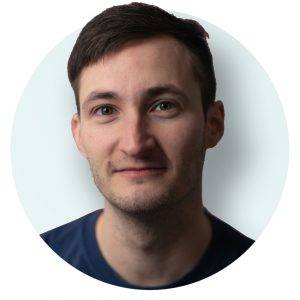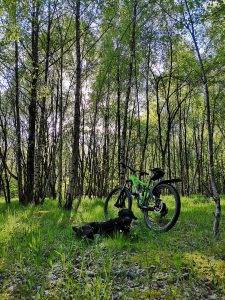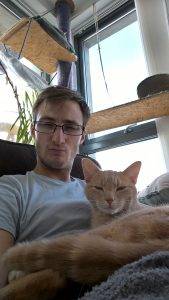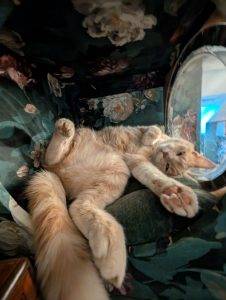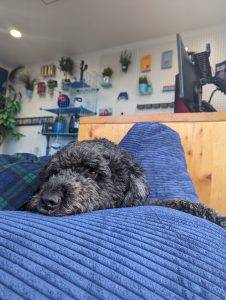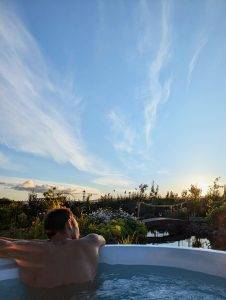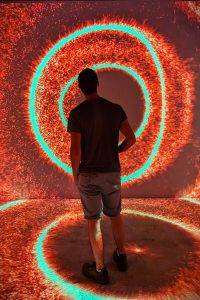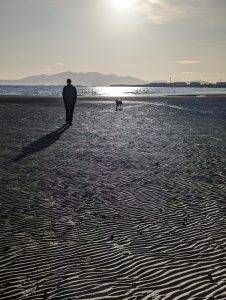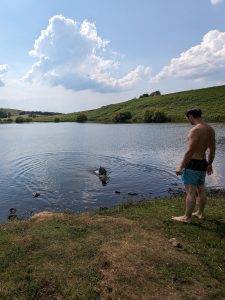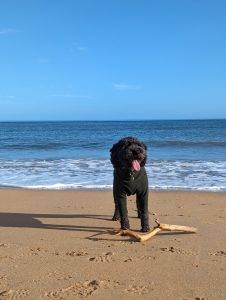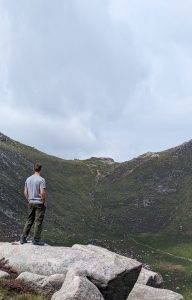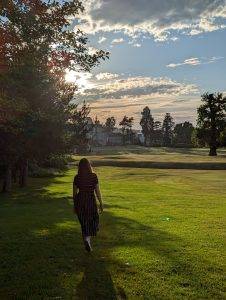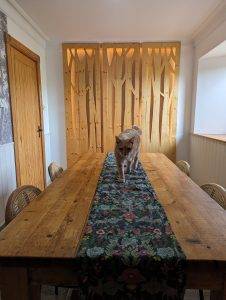I’m just back from the trip of a lifetime, skiing in France.
3 years ago this type of holiday would not have been possible for us.
I count my blessings every day.
It was truly a fairy-tale place.
Cosy cabins, epic mountain scapes, misty godrays split through hazy treelines stretched across jagged whitecapped peaks stretching off impossibly tall into soft pink skies at sunset.
Everywhere Skiers slalomed their way gracefully down the slopes…
I was not one of these elegant figures.
It turns out “easy” routes in the Alps are equivalent of “difficult” in the UK and I haven’t skied in 15 years. 😅
Nevertheless, after about a day of faceplants and cartwheels, and impressive pirouettes, I found my ski legs and mustered what might even be called grace.
We skied all day, at lunch we ate chips and drank cocktails in deckchairs in the snow,
came home to a 6-course meal, hit the spa then in the evenings we collapsed jelly-legged into bed to read as the sunset.
The sheer physical effort and concentration of skiing meant I spent all day in a sense of total flow,
Followed by long periods of intense but peaceful rest during the slow ascent up the slopes in the ski lift.
My brain was totally engaged in the moment at all times.
Except to check the route maps and snap a few photos, I didn’t use my phone at all.
It took almost 4 days until the usual habits crept back in.
When they did I didn’t even notice it had happened.
On the evening of day 4 I slept really badly.
I couldn’t figure out why until I realized the night before I had been scrolling on social for the first time in 4 days.
I didn’t even notice doing it at the time.
I hadn’t knowingly picked up my phone and said, “I’m going to ignore my wife and the beautiful view, and this amazing book, and scroll videos of cats falling off worktops.
I had set out to search for something, and my intentions had been hijacked and subverted against my will.
I was suddenly horrified by this prospect, that I hadn’t chosen my own actions.
How can you live a life by design if your intentions and attention are being hijacked by an army of forces?
I resolved to research and write about it on the way home.
Which ironically, added more to my plate in an already hectic week…
We are all familiar with that feeling of returning from holiday and playing “catchup”.
We live in a work-obsessed society, so naturally we feel a guilty pressure to act like we haven’t taken a holiday and try to “catch up” with our lives, instead of just resuming from where we left off.
I’m definitely feeling this pressure this week myself, and trying to fit more things into the same amount of time.
It’s the precise recipe for burnout, which is a symptom of trying to fit an impossible amount of things into a container which won’t fit them.
Luckily, during my holiday I was reading “Four Thousand Weeks” by Oliver Burkeman, a life-changing approach (I use this term literally) which recommends an opposite approach to productivity:
We don’t need more effective ways to get things done,
We just need to get comfortable with the idea that you won’t get everything done, and a way to focus on only the things that need to get done right now.
Part of this is Stoic mindset, but he’s also primarily talking about focus.
Focus.
Focus is a common trait in all high performers.
Focus is a superpower which lets you work on the right things and be ok with the anxiety of ignoring that which does not matter.
Deciding what not to do is more important than deciding what to do.
– Steve Jobs
And here lies the overlap between quality of life and productivity: People tend to think of focus and productivity as a work skill. But it’s also the route to better leisure time and more meaningful relationships with people and time.
And here lies the overlap between quality of life and productivity:
People tend to think of focus and productivity as a work skill.
But it’s also the route to better leisure time and more meaningful relationships with people and time.
Focus is simply what you direct your attention to.
Your experience of life or your “life” is simply what you pay attention to.
So in a very real sense, your ability to focus is a measure of your quality of life.
The world is not getting any less distracting.
You will ALWAYS have more to do than you have time to do it.
It’s a skill that’s becoming harder and harder to nurture as our environment is stacked against us, as
Culture drives towards ever more convenience, shortcuts, and distracting shallow experiences.
Every time we give in to these impulses we train our brain to respond to distraction.
Each time we resist we train our brain to focus.
Do you focus on the things in front of you,
or do you allow your attention to be tugged this way and that like a paper bag in the wind?
If you want free will, and if you want to live life intentionally, instead of by chance,
start working on nurturing your ability to focus now.
It’s not something that you simply decide “I’m focussed” and it’s done.
I’m far from an expert in focus.
In fact it’s something I’d say I struggle with a lot.
I have a lot of ideas, some good, some bad, that derail my progress in one direction.
I often set out to complete one task and instead start 4 or 5 others.
I struggle to finish something from beginning to end.
Most of us struggle to hold down a 9-5 and manage the house.
So how is it some people seem to launch and run a successful business, write several books, and invent world peace, all whilst raising several kids?
I’m often in awe of my wife’s ability to obsessively see complex projects through from start to finish, despite a whirlwind of distractions.
I suppose this comes from her career as a Dr,
I imagine focus is essential when you’ve worked an 80hr week, you haven’t had lunch, you’re trying to give someone an injection, your pager is going off, the nurse is chasing you to fill out your risk assessment, there’s an alcoholic trying to steal your ID badge and you just really badly need a poo.
In my case, I often set out to write, get a few words down, get distracted and 1hour later I find myself in the house putting away the washing with a nagging sense that I’ve forgotten to put on trousers.
I blame my past for this…
For years I was a “productivity addict” obsessed with getting more done with what little time I have.
I didn’t realize many of the “tools” and “hacks” I was using were actually harming my ability to focus,
and reinforcing my habits of novelty-seeking behaviors and multitasking.
As a result, I have to fight my addled brain back into a pattern of focus.
Training a new puppy is much easier than training a bad dog who has become accustomed to begging for scraps.
Every day without realizing, you are building habits that train your brain towards focus or away from it.
A million times a day you move your brain towards one or the other.
Each time you give in to mindless scrolling on your phone, you reinforce the habit of giving in to distraction.
Each time you choose to engage with your partner, instead of watching the tv in the background you train your brain towards focus.
You have to choose to focus.
Focus is certainly a choice to make, and a skill to master.
But like losing weight, it’s 90% environment 10% willpower. The good news is that you don’t need to master focus.
You only need to pick up the basics of focus to make drastic improvements to your work outputs and enjoyment of life.
As with most lifestyle changes, I recommend small tweaks to habits rather than drastic actions.
Focus is something I try to practice every day, to become someone who is focused.
In this article I’m going to outline a few things I’ve found helped,
picked up from various sources far more knowledge about productivity and focus than me.
In no particular order…
Choose intentionally
You can’t focus if you don’t know what to focus on.
Focus is more about saying no to other things, sometimes good things than it is about concentrating on one thing.
If you don’t have a long-term strategy then you won’t know what to say no to.
example:
If your customers are on LinkedIn, then why are you wasting your time on Instagram?
If your focus is to save for a house deposit, why are you going on holiday?
If your focus is to be a good parent, why are you working late to please the boss?
In each situation, you could feasibly do both, but this is about saying “No” to everything that isn’t on the optimal path.
Reduce your mental surface area
Your brain is not built to hold lots of information on hand.
Your brain is also built to hang onto unresolved tasks.
Just now I’m also experimenting with removing decision overwhelm,
I set a “roulette wheel” which chooses between a set of random activities for my rest break:
cycle, walk, weights, video games, read etc.
I’ve planned my Fridays off in advance so I don’t need to choose what to do.
It’s been shown that limiting your choices actually reduces stress.
This is why restaurant menus with 100s of options make it more difficult to choose than something with only x3 good options.
Think first
Even if your brain is fizzing and you feel the need to start, always take a little time to think before starting work.
It’s tempting to dive in. But a little time first will help you sort through the critical steps.
A dog walk is good for this or habitual chores.
Doing something which occupies a little bit of your brain’s “autopilot” feature, actually enhances your brain’s ability to think through problems.
It’s also why regular breaks are important.
I find this the hardest.
There are sometimes days I will start working on something at 8am and find its 3pm and I haven’t had breakfast yet.
I set an hourly chime on my phone app which reminds me to pause, reset, step away, and reassess what I’m working on, or even if I should be working at all.
My morning walk with the dog helps to clear my mind,
it’s important to direct your thinking, but with a gentle touch.
As random thoughts come to the surface I either dismiss them as irrelevant random brain noise,
or I allow the train of thought to continue.
By the time the walk is done, I’ve usually thought through and solved the first and most important problem of the day.
First things first…
Do your most important focus work early in the morning while you still have energy.
Emails and admin require the least focus and attention, so do them last.
Most people do this backward.
They start with the most comfortable and easy-to-deal-with tasks.
Then procrastinate on the hard important stuff until it’s too late and they have no energy left.
“Oh well, put it off till tomorrow” Repeat forever.
Build a deepwork ritual
Build a series of habits and actions you take which tell your brain you’re going to focus.
Repeat it every time until it’s a ritual. You don’t need dark basements, candles, or virgin sacrifices for this.
Eg:
- Get a coffee
- Move phone into another room
- Put on headphones
- Turn on brain.fm
- Write down most important task
- Tidy desk
- Close all tabs and windows
- start task.
Push past the nag
Congrats if you’ve completed your ritual and started the task. You’ve been many just by starting.
But there’s a strange phenomenon that stops most people from doing the task they set out to.
Soon into starting a task you’ll experience your first roadblock.
a challenge, or obstacle that makes you pause.
a discomforting feeling, a gag reaction almost like a swallow that makes you want to do something else.
I call it the “nag”.
Your brain likes to flow, like water, and seeks novelty. So the moment you hit a bump you have to fight that urge to check your phone, to move to another simpler, but less valualbe, task, to go online, to look at those notifications in your taskbar.
the first thing is preempt the nag. have all the tools you need to do the job already looked out,
have all the information you need to write the article prepared in your notes,
Even masters of focus talk about something which sounds like the nag, so I don’t think it ever goes away, but as times goes on you’ll get better and better at ignoring the nag.
Like the runner’s “second wind” once you push past the nag you’ll find yourself able to continue for a much longer period.
Though be wary of more nags popping up at later pause points.
Production over Perfection
When you talk about focus, most people conjure an image of a painter rapt in her art, or the master coder bashing out lines of code without pause.
The truth is that you aren’t Mozart, so it’s better to start messy and tidy up later.
Building momentum is more important than producing good results.
Focus most often means bashing out something messy, and checking in with yourself every ten minutes to make sure you’re still working on the same task.
“Good idea, but not now”
If you’re anything like me, you have a lot of good ideas.
These can derail your focus on great ideas.
Every time you have a new idea that you want to take action on, say this out loud.
“Good idea. but not now.”
Write down your idea. x1 line only. forget about it. you can revisit it later.
It’s amazing how much this helps.
Here’s some of my “amazing” ideas from 2023, than in retrospect, don’t look so hot.
“I need to start a community” (good idea, wrong time)
“treadmill desk” (there’s a much cheaper way to walk more: it’s called ‘walk more’)
“velcro climbing wall” (was this ever a good idea?)
This also works for reducing burnout by decluttering your mental load.
Don’t watch the news
The attention economy products content is designed specifically to elicit emotional reactions. Usually negative, because negative emotions are more powerful and feel good to indulge in.
Celebrity gossip, manufactured crisis, stories about our world leaders diddling kids.
Biased clickbait articles, usually one-sided, designed to spark office debates.
You cant change any of this, does it benefit your life to know about it?
Or will it just make you frustrated and angry?
If being up to date is important to you, if it’s important someone will tell you about it.
Then you can choose to find out more, using balanced sources.
Thank god I don’t work in an office anymore, it makes it easier to avoid engaging in office gossip and FOMO chat about the latest shows on Netflix.
I try to never watch the news.
Not because I don’t care,
but because there’s little I can do about it,
and I want to reserve my focus for things I care about.
Replace a portion of entertainment with education
Speaking of Netflix, I find the design of shows has increasingly become structured to create FOMO,
Where people feel obligated to watch a show, even if they don’t want to, just so they don’t feel left out of the conversation in the office.
Don’t get me wrong, I love a binge as much as the next person.
But choose to binge. Don’t just default to having it on in the background all the time.
Netflix encourages distraction, reading encourages focus, plus you learn stuff at the same time.
Netflix CEO said in this quote I find utterly monstrous:
“Our competition is sleep”
Try replacing an hour of Netflix with an hour of reading every day.
You won’t even recognize yourself in 6 months.
Here’s my reading list
Improve your inputs
bad inputs = bad outputs
It works the same in reverse.
I read X5 good newsletters which always inspire fresh new ideas and enhance my focus.
Wisdom made easy Michael J Boorman
Stephen Wise
Brain Food by Shane Parrish
Saturday Solopreneur by Justin Welsh
Work Less by Rich Webster
How to reduce Mobile phone use
I saved the best (or worst ) till last,
and this one is so important it has a whole section to itself.
Your mobile phone is a supercomputer in your pocket.
A powerful tool. Coated in yummy heroin.
It’s also is a little energy vampire in your pocket, a parasite draining your ability to focus, and sapping your potential to do great things.
Cultivate a healthy distrust of your phone.
Your phone is designed by teams of experts headhunted from behavioral science, gaming, and gambling industries to make it as addictive as possible.
The science of it is pretty horrifying, with monstrous things lifted directly from the gambling industry like:
“Reward prediction error encoding”, “Variable reward schedules”, “cycles of uncertainty”, “ludic loops”
I feel tremendous guilt about the short-term, dopamine-driven feedback loops that we have created are now destroying how society works
– Chamath Palihapitiya, former VP of User Growth at Facebook
The goal is to capture as much as your attention as possible.
To steal your attention and spend it on something you didn’t intend.
Have you ever felt your phone vibrating in your pocket, even when you didn’t have it on you?
This phantom signal is a sign of psychological craving. Congrats, you’re an addict!
But don’t worry, we’re all in the same boat 😅
We’re all addicted! You know it I know it everyone knows it.
It’s a feature of everyday life now.
It’s “harmless” enough that we don’t hit rock bottom, so few do anything about it and simply suffer the negative impact it wreaks on our personal, and professional lives and mental wellbeing.
It doesn’t end there.
Because after you put your phone down, your phone is still on your mind,
sneaking in every 5 seconds to tempt you to open it back up for one more dopamine hit.
We’ve all seen that guy on the bus, who can’t sit still, leg twitching for a fix, opening his phone every 10 seconds, scrolling, putting it in his pocket, repeat….
Imagine:
The whole world is technically categorized as addicted or displaying addictive behaviors.
How does this programming affect our behavioral patterns on a world scale?
- The way we interact with each other (or don’t)?
- Our perception of the world, our level of fear and distrust?
- Our ability for empathy, patience, and kindness?
- Our ability to handle hardship and unpredictability?
- Our ability to experience life as it happens, instead of recalling it later as a photo?
Scary sh*t!
But outside the scope of this article. I try not to think about it.
I’m just here to help you fight the twitch a little bit.
The reason why your phone is the enemy of focus is that when challenged, your brain seeks more attractive things to pay attention to.
Instead of thinking about a problem your brain wants to slip away into something more comfortable.
Ticking off smaller easier tasks just feels better.
And your phone is THE most attractive, comfortable thing around.
It’s as if Ryan Gosling and Ana De Armas had a baby, they stuck in a blender with some Heroine, then stitched a pair of fleece-lined slippers out of it.
That’s how attractive and comfortable your phone is to your brain.
Willpower or discipline alone won’t help you here.
Environmental change is much more effective at reducing screen time than willpower.
You are the weakest link, so remove yourself from the decision of whether to pick up your phone.
Get organized.
Decide how and when you want to use your phone.
If you want to scroll social, fine, but set a time and limit for it.
I leave an hour in the afternoon. Plenty of time.
It will be uncomfortable at first.
That’s because you’re an addict. So treat yourself like an addict.
Would you let a recovering alcoholic wander about with a fresh cold beer in her hand?
The most effective thing is just leave it somewhere else instead of in your pocket.
Then add as many things as you possibly can to add friction to the experience of using your phone and make it less pleasant.
- Make it so I have to enter a passcode each time to unlock my phone.
- Remove icons from your home screen.
- Keep it on vibrate only for calls.
- Turn off all notifications so YOU choose when to check them.
- Reply to texts and calls in batches, once every few hours is plenty.
- Schedule DND mode almost all the time. You can always call them back.
- Turn on greyscale mode permanently.
- Use focus mode to only allow yourself 5 mins of scrolling.
- Remove icons from your home screen. 2 or 3 extra swipes and taps add friction
- Use focus mode to limit apps to 5 mins. You don’t need more than this to do a task on social media.
- Check social media on your computer instead of your phone.
- Use Freedom.to to block apps overnight, and in mornings so you don’t check your phone during critical wind-down and rest time.
- Avoid apps with endless feeds like FB marketplace.
- Only open an app if you have a task to do on it.
- Resist the idea that you have to document your whole life.
But with time it gets less insistent, your head becomes clearer,
Instead of scrolling you are thinking clearly.
Instead of being anxious and crabby for no reason, you are optimistic and engaged.
You’re able to hold your focus for longer and longer periods.
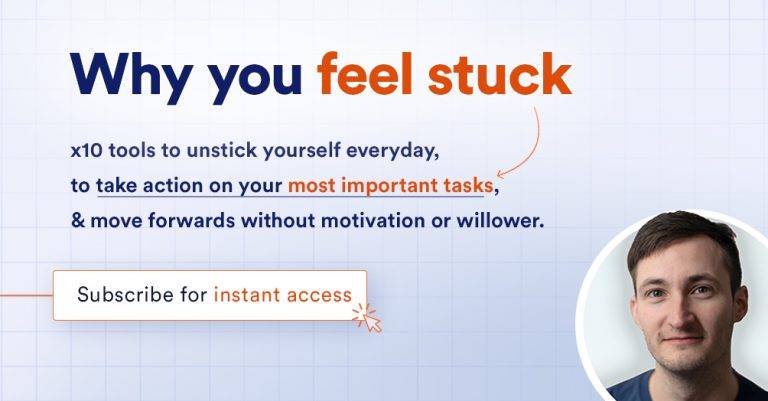
Want to take action on your Most important tasks?
Subscribe for instant access to my goals to action framework in the "Unstick yourself" masterclass.



